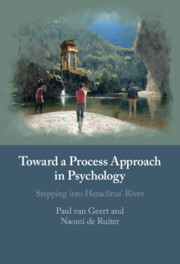Book contents
- Toward a Process Approach in Psychology
- Toward a Process Approach in Psychology
- Copyright page
- Contents
- Figures
- Acknowledgments
- Introduction
- Chapter 1 Change, the Final Frontier
- Chapter 2 A (Selected) Foundation for a Process Approach
- Chapter 3 The Goal of Socrates
- Chapter 4 Esteeming Entities
- Chapter 5 A Person Acting amongst Persons
- Chapter 6 Cliffhangers and Utilitarian Infants
- Chapter 7 Causes, Kings, and Interventions
- Chapter 8 (Compl)explanation and King Alfonso’s Lament
- Chapter 9 What’s in a Name?
- Chapter 10 (Un)Certainties
- Chapter 11 Troubled Waters of Heraclitus’ River?
- Chapter 12 Psychological Science as a Complex Dynamic System
- Glossary
- References
- Index
Chapter 3 - The Goal of Socrates
Philosophical Foundations for a Value-Laden, Action-Based Praxis of Research
Published online by Cambridge University Press: 14 July 2022
- Toward a Process Approach in Psychology
- Toward a Process Approach in Psychology
- Copyright page
- Contents
- Figures
- Acknowledgments
- Introduction
- Chapter 1 Change, the Final Frontier
- Chapter 2 A (Selected) Foundation for a Process Approach
- Chapter 3 The Goal of Socrates
- Chapter 4 Esteeming Entities
- Chapter 5 A Person Acting amongst Persons
- Chapter 6 Cliffhangers and Utilitarian Infants
- Chapter 7 Causes, Kings, and Interventions
- Chapter 8 (Compl)explanation and King Alfonso’s Lament
- Chapter 9 What’s in a Name?
- Chapter 10 (Un)Certainties
- Chapter 11 Troubled Waters of Heraclitus’ River?
- Chapter 12 Psychological Science as a Complex Dynamic System
- Glossary
- References
- Index
Summary
We discuss the broad organizational power-structures that regulate the virtues of doing science, the values upheld, and the introduction of novices into the scientific community. Aristotle’s scheme of knowledge is used to introduce the relevance of a value-laden praxis, of phronesis, which is the virtue of ‘doing’. We discuss these ideological issues in the context of classic philosophical notions put forth by Hannah Arendt (and her work on action) and Bruno Latour (and his work on praxis, actor networks, and inscription devices). This chapter thus serves as a broad foundation for analyses of the ways in which scientific virtues are deeply intertwined with the activities of psychological science. It sketches psychology as action-based and virtue-laden, based on the notion of a dynamic praxis consisting of interacting agents.
- Type
- Chapter
- Information
- Toward a Process Approach in PsychologyStepping into Heraclitus' River, pp. 44 - 60Publisher: Cambridge University PressPrint publication year: 2022

